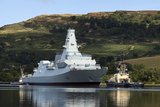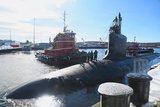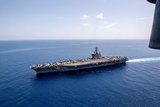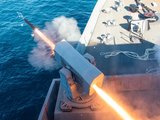Cyprus, Turkey spar after warships block gas drilling
Cyprus has insisted Turkey had breached ‘international law’ on 11 February after Ankara's warships blocked an Italian drilling ship on course to explore for gas in the island's politically sensitive waters.
Italy's energy giant ENI said its vessel was ordered to stop by Turkish ships on 9 February over ‘military activities’ in the destination area’ as it sailed to begin explorations in Block 3 of Cyprus's exclusive economic zone.
Turkey and the Greek Cypriot-majority republic have sparred over resources in the eastern Mediterranean, with Ankara pushing the claim of the unrecognised statelet it backs on the north of the divided island.
Nicos Anastasiades, President of Cyprus, said: ‘We are keeping calm in order to avoid any crisis and taking all diplomatic steps necessary so that finally Cyprus' sovereign rights can be respected.
‘We are handling the situation by trying to avoid anything that could worsen the situation without ignoring the fact that Turkey's actions are in breach of international law.’
However, Turkey's foreign ministry lashed out at Cyprus over the ‘unilateral hydrocarbon-related activities’ by the European Union's most easterly member.
Turkey's foreign ministry in a statement said: ‘It does so in disregard of the inalienable rights on natural resources of the Turkish Cypriot people, who are the co-owners of the Island.
‘This unconstructive Greek Cypriot attitude also constitutes a major obstacle to the settlement of the Cyprus issue.’
The island has been divided since 1974 when Turkish troops invaded and occupied its northern third in response to a coup sponsored by the military junta then ruling Greece.
Cyprus announced on 8 February that exploratory drilling by Italy's ENI and France's Total had found extensive gas reserves elsewhere off the island in a major breakthrough in its hunt for resources.
Cyprus has signed deals with a range of firms for exploratory drilling, with US giant ExxonMobil also planning two drills in the second half of 2018.
The dispute over resources in the Mediterranean is another complicating factor in efforts to reunify the island after negotiations on the 44-year feud collapsed in acrimony last year.
Turkey and Cyprus are not the only countries at odds over resources in the eastern Mediterranean, with Israel and Lebanon also feuding over competing claims.
More from Naval Warfare
-
![UK ‘Hybrid Navy’ steps up as Norway cooperation reinforces Arctic strategy]()
UK ‘Hybrid Navy’ steps up as Norway cooperation reinforces Arctic strategy
As Russia commits billions to new warships and stealth submarines, the UK is reshaping its strategy with expanded troop deployments, shared frigate fleets and a shift towards uncrewed platforms.
-
![US Navy to develop an undersea networking capability to support UUV operations]()
US Navy to develop an undersea networking capability to support UUV operations
The NEREUS project aims to enhance and expand the US Navy’s existing communications systems, enabling crewed/uncrewed seabed and subsurface missions.
-
![How the Hedge Strategy will impact the US Navy’s future capabilities]()
How the Hedge Strategy will impact the US Navy’s future capabilities
The US Navy Hedge Strategy is intended to provide a lethal, modular and cost-effective fleet while accepting Washington’s fiscal and industrial constraints.
-
![US Navy and Raytheon explore additional applications for Mk 58 CRAW torpedo]()
US Navy and Raytheon explore additional applications for Mk 58 CRAW torpedo
Designed as an anti-torpedo and anti-submarine capability, the USN and RTX foresee the Compact Rapid Attack Weapon’s potential for deployment from surface ships and aerial and uncrewed platforms.
-
![European navies line up $105.8 billion in unawarded contracts for 2026]()
European navies line up $105.8 billion in unawarded contracts for 2026
France, Germany and Italy lead the way on unawarded naval defence opportunities that could be awarded this year, but across Europe countries are ramping up their spending efforts to face geopolitical challenges.
-
![RTX Raytheon targets nearly 170% RAM production increase to meet global demand]()
RTX Raytheon targets nearly 170% RAM production increase to meet global demand
The US multinational company is currently assembling 300 Rolling Airframe Missile rounds per year, with plans to reach 800 units annually after significant investment and modernisation of its facilities.























